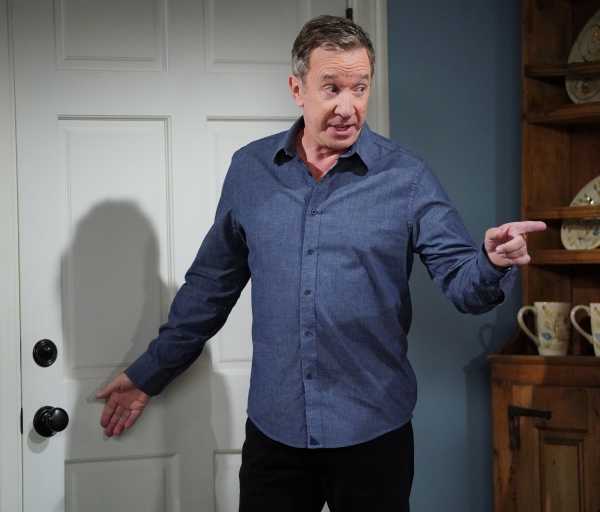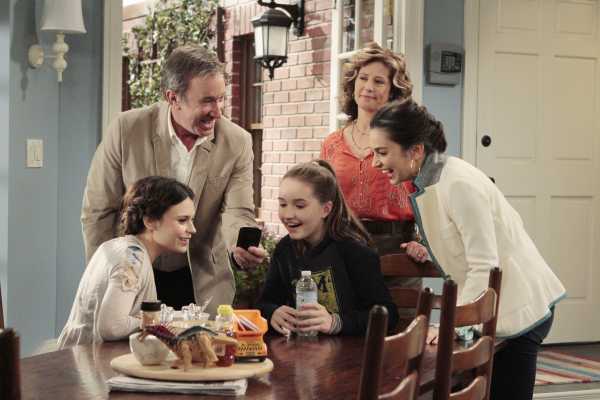
If you wanted to choose one TV show to seal up in a time capsule intended to explain the 2010s to far future robots who are curious about their human predecessors, you could do a lot worse than Last Man Standing.
The Tim Allen vehicle started out as a mostly innocuous family sitcom when it launched in 2011, a somewhat dated show about an archetypal manly man leading a household full of women. But as it evolved into a series about an older white man’s continued feelings of grievance, it unexpectedly became one of the pop culture artifacts that best predicted the rise of Donald Trump.
Related
One Show Explains the World We Now Live In: ABC’s Last Man Standing
Last Man Standing was one of the few shows on television to feature a politically conservative character as its protagonist. Though the views of Mike Baxter, Allen’s character, were more centrist than those of the man who played him, its depiction of intergenerational conflict between Mike and his daughters (and sons-in-law) got at something compelling about a generational divide between (mostly white) parents and children — a divide that few other TV shows even attempted to tackle.
But though the show broached political topics and let Mike wave his conservative flag, its focus was almost never on politics. It was a show about a family who, at the end of every day, still loved each other. Almost as many episodes were about mundane family arguments as they were about big political fault lines.
For all that Allen and former showrunner Tim Doyle — who oversaw the series from season two to season four and shifted it into more political territory — wanted Last Man Standing to be a new All in the Family, the issues that Mike and the rest of the Baxter clan argued about rarely impacted them in any real way. They were insulated in a way that Archie Bunker and company never quite were.
Did the Baxters’ isolation from true political consequences matter? Not even in the slightest. Because in 2017, ABC canceled the show after its sixth season, and it became a political football all the same, after many suspected the show had been canceled due to Allen’s support for Trump. Now, the series is back on Fox after a year off the air, and it’s almost as fascinating as it’s ever been.
Last Man Standing was part of a wave of shows asking, “Yes, but what about men?” No one could have realized how prescient that would be.

When Last Man Standing debuted on ABC in October 2011, the press covered the show in one of two ways. The first was both predictable and ephemeral: Last Man Standing would mark Tim Allen’s return to the network that made him famous, where he starred in Home Improvement, one of the biggest hits of the 1990s, from 1991 to 1999.
Indeed, the premise of Last Man Standing almost felt like an updated Home Improvement — instead of hosting a home improvement show and having three sons, Allen’s character would work at a sporting goods store and have three daughters. Around the time of his Home Improvement tenure, Allen had also achieved great success in movies like The Santa Clause (1994) and Galaxy Quest (1999), and even though he’d had a harder time finding hits in the 2000s, after the show had ended, it was still considered a coup that he was coming back to TV at all.
It was the second way that reporters covered the debut of Last Man Standing that turned out to be oddly prescient: They wrote about the show as a sitcom of the so-called “mancession,” part of a wave of comedies that debuted in the 2011–’12 TV season that were about the supposed emasculation of men, compared to the empowerment of women.
Most of the mancession sitcoms are shows whose existence you’ve since forgotten, if you ever knew of them at all — shows like Man Up and How to Be a Gentleman and Work It (in which two men can’t get a job, so they begin cross-dressing as women; it was canceled after two episodes). They were purportedly spurred by an Atlantic article by Hanna Rosin called “The End of Men,” which charted how the Great Recession prompted a collapse in certain male-dominated industries, while industries that employed more women weren’t as gutted.
Related
I spoke to hundreds of American men who still can’t find work
But the “mancession” sitcoms (save for, I guess, Work It) weren’t really about a decline in men’s employment. They were, instead, about a general sense that masculinity was being infringed upon, that women were ascendant and men descendant, and that society didn’t terribly care what happened to men. As if to drive the point home, the two biggest comedy hits of that fall were about women who were (at least theoretically) doing it for themselves — 2 Broke Girls and New Girl.
Last Man Standing survived because it starred Tim Allen, more or less. The premise of its first season — a man feels overwhelmed by all of the women in his life and isn’t sure he has the room to be a man anymore — was thin, as these things go. The show was created by 30 Rock writer Jack Burditt, and he might have eventually made something of it. But a family tragedy led to him leaving the show, and Last Man Standing drifted aimlessly through its first season, losing half of its premiere audience. It seemed like a solid candidate for cancellation, like all of the other mancession shows.
Last Man Standing had a good cast, but it never seemed to gel. Allen frequently seemed bored, and the idea that white men were being subjugated in a way they never had previously was mocked by critics and journalists. The show managed a season two renewal, but it was banished to Fridays (It had been on Allen’s old Tuesday night haunt.) Even as it was renewed, it felt unlikely that it would ever see a third season. And then it hired Tim Doyle.
Starting in season two, Last Man Standing became a show about politics —but only sort of

Doyle is one of those journeymen showrunners who are brought in on troubled productions in an attempt to salvage them. Usually, it doesn’t work because there’s too much water under the bridge. But in the case of Last Man Standing, Doyle and Allen were on the same page, which made things easier. And what they wanted to do was make the show more like All in the Family.
Their first order of business was to import the ’70s sitcom’s most obvious source of conflict — a constant political battle of the wills with a know-it-all lefty son-in-law. The foundation was conveniently already in place, thanks to an unspoken bit of Last Man backstory: Mike’s oldest daughter, Kristin (Alexandra Krosney in season one; Amanda Fuller in all seasons thereafter), had gotten pregnant in high school, and was now raising her son as a single mother, with the backing of her parents.
So season two brought Kristen’s ex-boyfriend, Ryan (Jordan Masterson), back into the fold. Thus, Mike’s grievances about Ryan letting down Kristin and their child by skipping town were papered over with fights about Barack Obama and Mitt Romney, and the personal subsumed into the political. It was a smart way to be like All in the Family but put a different spin on the material.
But the show also began sharpening its other conflicts by transforming Mike into a somewhat reactionary old-school conservative, who loved being a guy’s guy and believed in rugged self-determination. Then it made everybody else in his circle not so sure about his positions, to varying degrees.
To its credit, the show attempted to seriously explore these conflicts, as when youngest daughter Eve (Kaitlyn Dever) expressed an interest in the military, and both Mike and his wife Vanessa (Nancy Travis) worried what might happen to her, or when Ryan objected to his son taking part in a school play that featured negative stereotypes of Native Americans, only for the story to pivot to the characters wondering if his sudden return to his son’s life was sincere, or if he’d just flake out again.
Still, I don’t want to oversell Last Man Standing. It often just had its characters shout political talking points at each other — though that might have honestly been a fairly accurate depiction of 2010s political arguments. And there were times when it inadvertently ended up making arguments like, “A little bullying can be good!” when it really seemed as if it were trying to argue the opposite.
But at its best, the new Last Man Standing was one of only a few pieces of pop culture in the 2010s that really dug into how many older Americans (mostly white and mostly male) looked at the waves of change coming up from younger folks — often from their own kids — and reacted with a slack-jawed, “Wait. Why do I have to change?” The topics that it tackled, from spanking to gun control to political correctness, felt eerily like a sitcom rehearsal for the grievances that would drive the 2016 presidential campaign.
And the show balanced Mike’s point-of-view against that of its other characters. Yes, because he was the protagonist and because he was played by Tim Allen, he got the most time on the soapbox. But he usually learned a thing or two by episode’s end, if only to keep the family peace. (Doyle has said that Allen mostly wanted to get to speak conservative talking points — he honestly didn’t care if Mike “won” the argument in the end, because he intuitively knew there would be people who just wanted to see a conservative on TV.)
What ultimately kept Last Man Standing from true greatness, to my mind, was the simple fact that for Mike and his family, many of the debates they engaged in were strictly theoretical. They had plenty of money from Mike’s job at the outdoor store and Vanessa’s work as a geologist (and later a teacher). They were all white, save for a couple of Mike’s friends. They were all cisgender and heterosexual (so far as we know to this point).
There’s nothing wrong with making a show about characters who are firmly entrenched in positions of privilege and power. (If there was, we’d have to get rid of most of the shows on TV.) But it sometimes felt as if Last Man Standing’s characters were arguing about politics just to argue about something, not because they cared passionately about any given issue. They didn’t have actual skin in the game, unlike Archie Bunker and his family, who really did struggle with money or the labor union or Archie’s bone-deep prejudices.
And like so many other sitcoms about politics, Last Man Standing used the issues of the day as a convenient wedge to reliably divide its central family so it could reaffirm their essential bond at the end of every episode. The results could be genuinely sweet, but the approach meant the show treated politics as a MacGuffin. It wasn’t really about politics so much as it was about the primacy of family, and the idea that there’s nothing you can’t overcome if you love each other enough (and if you have a fair amount of money). And even after Doyle departed the show at the end of season four, that’s held true.
That’s why it’s been so weird to see Last Man Standing become a political football.
Tim Allen is a somewhat enthusiastic Trump supporter. Mike Baxter is a more reluctant Trump supporter. Neither is why the show was canceled.

When ABC canceled Last Man Standing in the spring of 2017, after its sixth season, many people were genuinely surprised. The show had grown to become ABC’s second most-watched sitcom after only Modern Family; season six was its best-rated season since its first, and it found a warm reception in syndication, where reruns routinely ranked well on the weekly charts.
Related
5 reasons ABC might have canceled the Tim Allen comedy Last Man Standing
But from another perspective, the show’s cancellation made some degree of sense. Though the show had grown in total viewers, it had actually slumped slightly among the younger viewers advertisers most care about. And the series wasn’t produced by ABC Studios, the network’s in-house production unit. Instead, it hailed from 20th Century Fox, so ABC had to pay another company entirely to air the show.
Considering that Last Man Standing starred a big-name actor and was entering its seventh season (when cast salaries begin to get more and more expensive), it was only going to cost the network more and more money for what was ultimately a modest hit. Looking at the show in terms of ABC’s bottom line, canceling it made sense.
Yet when the cancellation was announced, plenty of people jumped to another conclusion: The show had been axed because Tim Allen was a Trump supporter, and he played one on TV.
Now, compared to, say, Roseanne Barr, Allen’s Trump support has been more of the, “Let’s just give him a chance!” variety, save for the time he compared being a Trump supporter in Hollywood to, uh, living in 1930s Germany. (That one made people mad — and it came just a couple of months before Last Man Standing’s cancellation.)
But considering that Last Man Standing was a show about a guy feeling aggrieved by how the world was changing right in front of him, with an audience of people who would type in all caps about how they agreed with the character and/or the man playing him in Deadline comments sections about the series, it wasn’t too hard for many to jump to the conclusion that Allen, one of the few open Trump-supporting celebrities out there, was being silenced.
What was especially weird about this response was the fact that in the wake of the 2016 election, Last Man Standing had subtly backed off of politics, almost as if it could sense that there wasn’t a good way to have Mike do a victory dance or something of that nature without turning off somebody (if only his own kids).
Instead, the show doubled down on stories about the family, throwing in a couple of social issues storylines — like one where Mike and Vanessa wondered why their daughters no longer went to church — but mostly focusing on conflicts among the three Baxter kids. Indeed, what turned out to be the de facto series finale for the year the show was off the air was an episode about Mike’s middle daughter, Mandy (Molly Ephraim, in a quietly genius performance), shadowing him at work and some of the characters joining a kickboxing class. High political theater it was not.
And yet the idea that Tim Allen had gotten his show canceled simply by speaking out persisted, no matter how many times the star insisted it was a business decision on the part of ABC. (To some degree, the anger over the cancellation helped the series return, since it kept its profile high while it was off the air.)
So to many people, it didn’t matter that, when Fox picked the show up in the same week that it canceled a number of shows known as more progressive-leaning series — especially Brooklyn Nine-Nine — it was also a business decision, since Fox, after all, owns Last Man Standing, at least for now. (You can read a lot more about all of this here.) In their minds, the narrative where the show was an embattled series about a conservative character, one that ultimately won the resurrection it deserved, made a lot more sense.
Related
Brooklyn Nine-Nine and Last Man Standing were saved from cancellation for the same reason
But even if Last Man Standing is a little overblown as a political football, the first two episodes of its new seventh season (which debuts tonight at 8 pm Eastern on Fox) make clear that it’s finally become a much more interesting series about a topic it’s always flirted with: masculinity.
Somewhere at its core, Last Man Standing is still a show about men who feel out of time and out of place — and how that feeling can hold them back

In the genuinely affecting second episode of Last Man Standing’s new season, Mike is forced to confront the fact that he has deeply buried the grief he feels over the death of a loved one — both because he misses that person and because he never had a great relationship with them. He’s mourning not only the relationship he had, but the one he could have had, if he and the late loved one had just been open about their feelings.
And the story expands from there: Has Mike’s inability to express himself emotionally hurt his ability to be a father to his girls? Yes, they know he loves them — but, also, do they? None of these questions are all that unusual for a family sitcom to tackle. But Last Man Standing has reached a point where its more emotional and dramatic moments work better than its comedic ones, which are increasingly just a series of moments where Mike chortles about the results of the last election.
There are plenty of things that don’t work about the new episodes, including a lengthy prologue to the season premiere that involves all of the characters talking about how their favorite show has been canceled, but maybe it will be picked up by another network, etc., etc., etc.
And that’s to say nothing of the recasting of Mandy, since Ephraim is now busy with other projects, a development that is also addressed via several strained meta-jokes. (Mandy’s now played by Molly McCook, who is very, very different in the part. That’s the only judgment I feel comfortable making for now.)
Dever, too, has opted not to return to the show full-time, though she will guest-star in a handful of episodes. And Eve, at least, is off at the Air Force Academy, so it makes sense she’s only around occasionally.
But throughout both episodes Fox sent out for review, there are moments when it really does feel as if Last Man Standing is attempting to confront what it means to be someone who is glad Trump is president but also starting to realize how much that scares other people in your family.
The show still falls back on, “Hey, let’s not let politics come between us! We’re a family!” as its solution to almost everything. But Mike, at times, seems almost like he’s genuinely worried about his son-in-law, who contemplates moving back to Canada, he’s so anxious. It’s almost a big step for the character.
There’s also a clear willingness to delve back into the show’s original premise and confront the ways in which it comes up short. Last Man Standing is still interested in the rituals of male bonding and the ways that guys shoot the shit when they’re alone together. But there’s also a growing sense that Mike might be more of a softy than he lets on, or that the character is becoming aware of his responsibility to the larger world.
Last Man Standing is never a show I want to over-praise. It still makes incredibly crass jokes (in these first two episodes, said jokes include cracks about the family separations carried out at the border), and its characters continue to live in a giant bubble of their own privilege that the show doesn’t dare contemplate. But if the last half of the show’s final season on ABC felt as if the show had looked at Trump’s election and blinked, then these first two episodes, while they don’t quite engage with that world head-on, do, at least, try to find a sideways window into what it means to be alive today.
Last Man Standing has never been a perfect show, and at many points in its run, I wouldn’t have even called it a good show. But it has always tried its damnedest to be an honest show. The deeper it gets, the more it feels like the connections among its characters matter, and the more it seems to interrogate whether the way Mike has lived his life has let him have as full an experience of that life as possible.
Last Man Standing is never going to be as courageous as it thinks it is — but it keeps tiptoeing toward some greater understanding of itself and its characters. Those baby steps make all the difference.
Last Man Standing returns Friday, September 28, on Fox at 8 pm Eastern.
Sourse: vox.com






